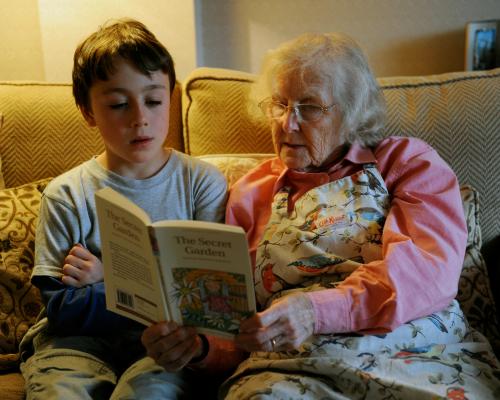
I look after my grandchildren – at least a few hours for one day a week, often more (‘There’s an overwhelming bond of love’: the grandparents whose kids rely on them to raise a family, 29 July). I love them deeply, and want to offer them whatever steadiness I can, while I can. But love alone isn’t what holds this together. I also care for them because their parents, like so many others, are stretched to the edge. Childcare is unaffordable. Work is relentless. There’s little left in reserve. Many grandparents step in not as a choice, but as the only available buffer in a fraying system. But that help comes at a cost. Caring for young children is tiring at any age; for older adults, after a full day or more, the next day is often a write-off too, which seems to be something almost no policy takes into account.
This reflects the gradual withdrawal of social responsibility from care, and the assumption that families will absorb the shock. We’re seeing the effects of this every day through exhaustion, silence and strain carried behind closed doors. As a systemic psychotherapist, I try to pay attention to patterns; what holds people together, and what pulls them apart. One pattern I see is that the work of care has become more vital, yet less visible. Grandparents, like many others, are holding families together behind the scenes. But we rarely speak about it, and policy almost never accounts for it.
In this era of rapidly evolving climate disruption and growing social fragility, care is the connective tissue that keeps communities alive. If we fail to recognise and support it, we weaken the very systems we’ll need to face what’s coming.
Dr Hugh Palmer
Pocklington, East Yorkshire
• I read your article with great interest as the grandparent of four children, but was sad that you did not take the opportunity to comment on the benefits and burdens for those of us who care full-time for our grandchildren. Over half of the estimated 140,000 children in kinship care are with grandparents full-time, and we are most definitely “taking on a level of grandparenting that looks a lot more like parenting”.
We do miss out on “just being Granny” as we perform the parenting role with the grandchildren in our care. One of the losses I feel as we parent our 12-year‑old grandson towards adulthood is that he misses out on grandparents and we miss out on grandparenting.
Unlike part-time grandparent carers, we don’t have less anxiety as we deal with loss of work and income, lack of support, and difficult relationships with biological parents. And our chances of pursuing our own retirement plans are not limited – they’re gone. We also struggle with the cost, the sense of obligation and the feeling of having no choice, but to a much greater extent. And we most certainly “plug the gaps of a system not fit for purpose”. In our case, this is the children’s social care system. The alternative forms of care for our grandchildren continue to have persistent deficits that lead to very poor life chances.
There are so many benefits to us in terms of the loving relationships we have with our grandchildren, but the deficits are often serious and damaging to our mental health and, sometimes, the stability of our kinship families.
Name and address supplied
• When I read about grandparents caring for and loving their grandchildren I feel such utter sadness and envy. Not because my children don’t have grandparents but because their grandparents aren’t interested in being around them. It’s a certain kind of heartache, not to mention the practical side of living with the exhaustion of not having help and having a disabled child.
I know they are busy, they have their lives to live, and I understand their desire to protect that. But I will never understand their indifference to their grandchildren and our situation. Everyone who has parents who are involved in their grandchildren’s lives are the luckiest people – I hope they know that.
Name and address supplied
• Surely grandparents being heavily involved in child raising is only new for the middle classes? Nans at the school gate was absolutely the norm when I was growing up in the 80s, and as a mother of 10, my mother’s Mam always had a houseful of grandkids.
Tracey Houghton
Newport
• Have an opinion on anything you’ve read in the Guardian today? Please email us your letter and it will be considered for publication in our letters section.





